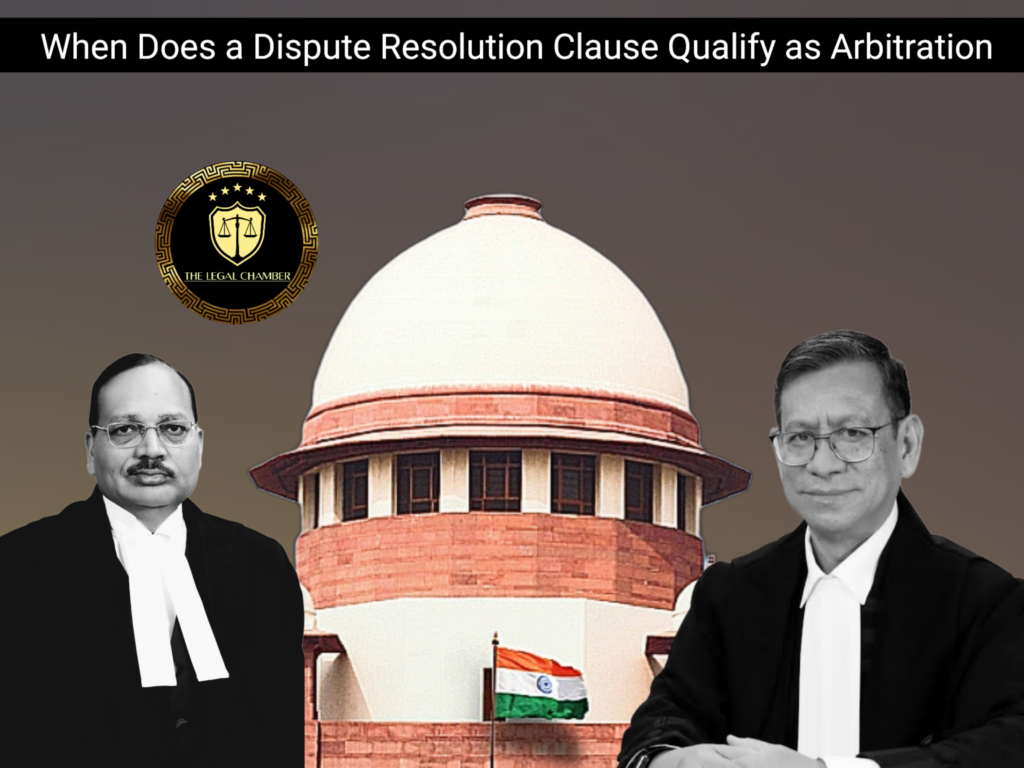
The Supreme Court ruled that Article 20 of the Concession Agreements between MCD and private contractors did not constitute a valid arbitration clause under Section 7 of the Arbitration and Conciliation Act, 1996. The Court emphasized that clauses lacking mutual intent, impartial adjudication, and procedural fairness cannot be enforced as arbitration agreements, directing parties to pursue alternative remedies. The judgment reiterated the essential elements of arbitration clauses from K.K. Modi v. K.N. Modi (1998) and upheld precedent in SDMC v. SMS AAMW Tollways (2019).
Facts Of The Case:
The case involved three separate appeals before the Supreme Court concerning Concession Agreements between the Municipal Corporation of Delhi (MCD) and private contractors (SMS Ltd., DSC Ltd., and CCC Ltd.) for developing multi-level parking and commercial complexes in Delhi. Disputes arose over delays, alleged breaches, and termination of these agreements. The core issue was whether Article 20 of these agreements—titled “Disputes”—constituted a valid arbitration clause or merely prescribed mediation. The contractors argued that Article 20 mandated arbitration, while MCD contended it only allowed for mediation by the Commissioner. The Delhi High Court delivered conflicting judgments—upholding arbitration in two cases (SMS Ltd. and CCC Ltd.) while rejecting it in the third (DSC Ltd.). The Supreme Court consolidated the appeals to resolve this inconsistency. It examined the language of Article 20, noting it lacked key arbitration elements such as neutral adjudication, party autonomy in arbitrator selection, and procedural fairness. The Court highlighted that the clause allowed MCD to unilaterally appoint an officer, undermining impartiality, and lacked terms like “arbitration” or “Arbitration Act.” Ultimately, the Court set aside the High Court’s rulings favoring arbitration, upheld the decision rejecting it, and clarified that parties must pursue alternative legal remedies. The judgment stressed the need for clear drafting of dispute resolution clauses to avoid prolonged litigation.
Procedural History:
The procedural history of this case traces its origins to disputes arising under Concession Agreements between the Municipal Corporation of Delhi (MCD) and three private contractors (SMS Ltd., DSC Ltd., and CCC Ltd.). The contractors, alleging breaches by MCD, invoked Article 20 of their agreements, claiming it mandated arbitration, while MCD argued it prescribed only mediation.
The contractors approached the Delhi High Court under Section 11(6) of the Arbitration and Conciliation Act, 1996, seeking the appointment of arbitrators. The High Court delivered divergent rulings: in SMS Ltd. (2017) and CCC Ltd. (2022), it held Article 20 to be an arbitration clause and appointed arbitrators, while in DSC Ltd. (2022), it rejected arbitration, terming the clause a mediation provision.
Aggrieved parties filed Special Leave Petitions (SLPs) before the Supreme Court, which issued interim stays on the High Court’s orders. The cases were consolidated due to their identical legal issue. After hearings, the Supreme Court set aside the High Court’s rulings in SMS Ltd. and CCC Ltd., upheld the DSC Ltd. decision, and clarified that Article 20 did not constitute an arbitration agreement. The Court directed parties to pursue alternative remedies, concluding a protracted legal battle spanning nearly a decade.
READ ALSO :Who Pays for Delays in Power Projects? : Supreme Court Explains CERC’s Role in Tariff and Compensation
Court Observation:
The Supreme Court made several critical observations while adjudicating the nature of dispute resolution clauses in the Concession Agreements. It emphasized that for a clause to qualify as an arbitration agreement under Section 7 of the Arbitration and Conciliation Act, 1996, it must demonstrate clear intent to arbitrate, provide for a binding adjudicatory process, and ensure compliance with arbitral norms including neutrality and procedural fairness. The Court noted that Article 20 of the agreements failed these tests, as it lacked essential arbitration elements like party autonomy in arbitrator appointment, adversarial proceedings, and neutral adjudication.
The Bench highlighted that the clause’s unilateral control by MCD in appointing officers and its labeling as “Mediation by Commissioner” indicated a non-arbitral mechanism. It distinguished arbitration from mediation, stressing that finality of decisions alone does not equate to arbitration. The Court also criticized the ambiguous drafting of such clauses, which led to prolonged litigation over the mere mode of dispute resolution. Relying on precedents like K.K. Modi v. K.N. Modi (1998) and SDMC v. SMS AAMW Tollways (2019), it reiterated that arbitration clauses must reflect mutual consent and judicial safeguards to be enforceable. The judgment underscored the need for precision in contractual drafting to avoid frivolous disputes and judicial inefficiency.
Final Decision & Judgement:
The Supreme Court delivered a definitive judgment, allowing the appeals filed by the Municipal Corporation of Delhi (MCD) while dismissing the contractors’ claims for arbitration under Article 20 of the Concession Agreements. The Court set aside the Delhi High Court’s rulings in SMS Ltd. and CCC Ltd., which had erroneously interpreted the dispute resolution clause as an arbitration agreement. Conversely, it upheld the High Court’s decision in DSC Ltd., which correctly rejected the arbitration plea.
The Court categorically held that Article 20 lacked the essential attributes of an arbitration agreement, as it failed to ensure mutual intent, impartial adjudication, or procedural fairness. Notably, the clause permitted MCD to unilaterally appoint officers—a feature antithetical to arbitration’s foundational principles of neutrality and party autonomy. The judgment reinforced precedent, including K.K. Modi v. K.N. Modi (1998) and SDMC v. SMS AAMW Tollways (2019), underscoring that labels like “final and binding” are insufficient to convert a mediation clause into arbitration.
While barring arbitration, the Court preserved the parties’ right to pursue alternative remedies under civil law. It admonished poorly drafted clauses for wasting judicial time and urged legal practitioners to draft dispute resolution mechanisms with precision and clarity. The ruling aims to curb frivolous litigation and uphold the integrity of arbitration as a consensual, equitable process.
Case Details:
Case Title:South Delhi Municipal Corporation of Delhi & Ors. vs. SMS Limited & Ors. Citation:2025 INSC 693 Appeal No(s):SLP(C) No. 17510/2023 and Connnected matters Date of Judgment:15th May 2025 Bench:Justice Surya Kant & Justice Nongmeikapam Kotiswar Singh
Download The Judgement Here